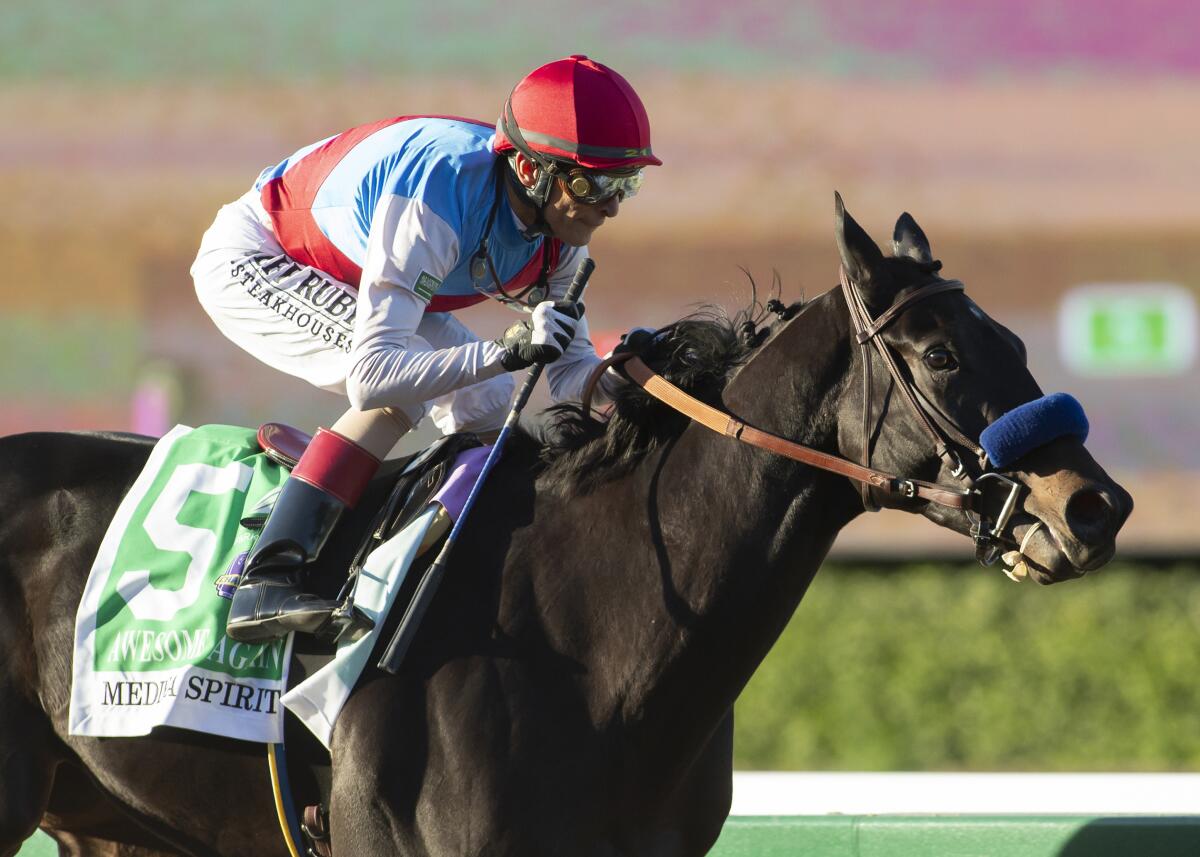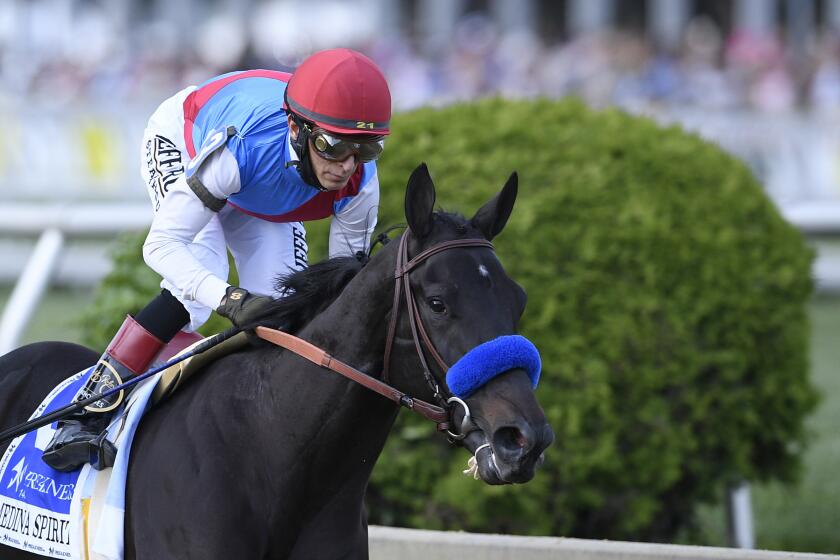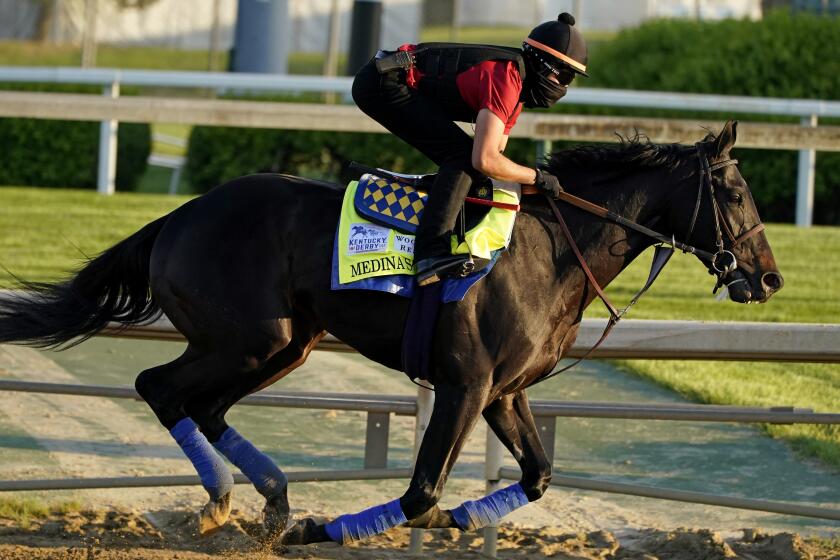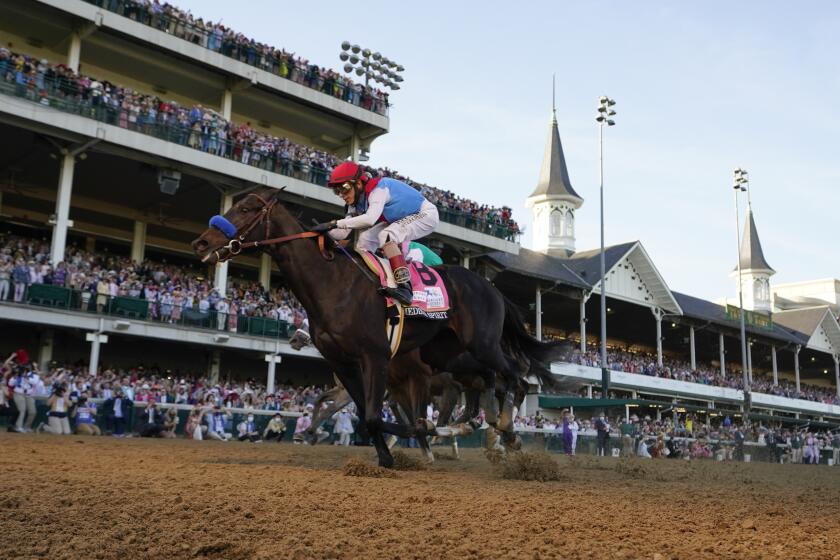Cause of Medina Spirit’s death remains unknown, no unexpected drugs found

- Share via
The long-awaited necropsy into the death of conditional Kentucky Derby winner Medina Spirit did not determine a cause of death but found no unexpected drugs or substances in the 3-year-old colt’s body.
The inconclusive result is not unusual in horses who are classified as “sudden death.” The cause of death of a horse that does not break down, or suffer a bone or joint fracture, can often be difficult to determine. About half the time they are able to conclusively determine what causes a sudden death in a horse. About a quarter of the time the cause is presumptive and a quarter of the time it is unknown. The Medina Spirit case falls into the last category.
However, some findings such as swollen lungs, foam in the windpipe, enlarged spleen and mild bleeding, “are compatible with, but not specific for a cardiac cause of death,” according to a news release distributed by the California Horse Racing Board.
Medina Spirit, who died Monday at Santa Anita, was an underdog who won the Kentucky Derby. But a potential disqualification could alter how he is perceived.
“Omeprazole (an anti-ulcer medication) and furosemide (aka Lasix, a diuretic) were detected in blood and urine samples consistent with the medication report filed with the California Horse Racing Board by the attending veterinarian,” the news release said.
“No other drugs, heavy metals (including cobalt), or toxicants were detected. Thyroxine levels were below normal reference limits.”
Dr. Francisco Uzal, who worked on this case for UC Davis, admitted that little could be determined from the thyroxine test because most research is done on live animals and not a deceased one such as Medina Spirit.
Scott Chaney, executive director of the California Horse Racing Board, called the Medina Spirit necropsy possibly “the most important ever done” by the state regulatory agency.
After the horse collapsed and died at the conclusion of a workout Dec. 6, his body was taken to a UC Davis testing facility in San Bernardino. There, blood, urine and tissue samples were taken from virtually every organ, muscles and the spinal cord.
Some samples were sent to other laboratories such as those at the University of Minnesota, which has done extensive work with cardiac issues, and also Cornell. A team of five veterinarians, pathologists and toxicologists examined the samples at UC Davis. The results were then reviewed by Dr. Laura Kennedy at the University of Kentucky and Dr. Grant Maxie at the University of Guelph in Canada.
“Blood [and] urine ... were screened for the presence of hundreds of substances, both legal medications and prohibited drugs, including, amongst others, erythropoietin (EPO), clenbuterol and betamethasone,” according to the news release.
California Senator Dianne Feinstein wants a “thorough and transparent examination into the death” of Kentucky Derby winner Medina Spirit.
Chaney and some board members were not made aware of the results until Thursday afternoon.
“Sudden death in racehorses has been frustrating for some time,” said Dr. Ashley Hill of UC Davis, who helped oversee the the necropsy. “We recognize that there is an issue that there are horses that just drop dead after exercise. It’s extremely frustrating.”
Few positive drug tests have received the kind of attention as the one by Medina Spirit. A week after the Kentucky Derby, trainer Bob Baffert was informed the Kentucky Derby winner tested positive for betamethasone, an anti-inflammatory that is normally administered intra-articularly. Betamethasone is a legal medication but not legal on race day. It is not considered a performance enhancer in the traditional sense, but if it relieves discomfort it could allow a horse to run better, much like a human athlete who takes an aspirin or ibuprofen.
Baffert at first said he had no idea how the drug got into his colt’s system. Two days later he announced that the horse had been treated for a rash on his hind quarter with an ointment that contains betamethasone. Despite the passage of time, Baffert will have his first hearing in Kentucky on the matter next week, 10 months after the positive was detected. Baffert’s attorneys will argue that the rule applies only to betamethasone that is injected, not applied topically.
Ben Moeller of UC Davis, who also worked on the Medina Spirit necropsy, believes there is no connection between betamethasone and the colt’s death.
“In my opinion it’s unlikely the therapeutic administration of a corticosteroid eight months ago would lead to its premature death,” Moeller said. “There is no evidence to suggest that.”
Shortly after the positive test result became public, Churchill Downs announced a ban on Baffert for two years, citing multiple medication infractions in a little over a year. Two were minor and resulted in a fine, two were caused by contamination and affected other horses not trained by Baffert, and the Medina Spirit case, which has not been heard by the state. New York also followed with a ban, which was initially rejected by a judge because of a lack of due process. A formal hearing was recently held but the hearing officer has not yet ruled.
Trainer Bob Baffert earns a record seventh Kentucky Derby win when Medina Spirit holds of Mandoulan for a victory in the 147th Running of the Roses.
Dr. Jeff Blea, equine medical director for the California Horse Racing Board, was collateral damage in this case when the California Veterinary Medical Board filed charges against him and asked that his license be revoked in part because he was overseeing the Medina Spirit investigation. The California Horse Racing Board removed Blea from the case but that did not keep a hearing officer from temporarily revoking his veterinary license. The claims against Blea, based on past rulings, are minor in nature and normally result in a warning or small fine not the loss of a license. The alleged infractions occurred before he was equine medical director.
Blea is currently on administrative leave from UC Davis, which employs him and in turn lends him to the California Horse Racing Board. Two people at UC Davis have been assigned the statutory requirements of the equine medical director while Blea is on leave.
Now that the results of the necropsy of Medina Spirit has been made public, a review will be conducted by the California Horse Racing Board to determine if there were any rules violations or if there should be any disciplinary action. The review will be done by Dr. Alina Vale along with a safety steward and a member of the Board of Stewards.
No timetable has been set for further review.
More to Read
Go beyond the scoreboard
Get the latest on L.A.'s teams in the daily Sports Report newsletter.
You may occasionally receive promotional content from the Los Angeles Times.














